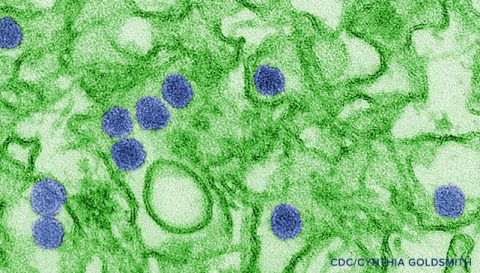The rapidly developing Zika virus (ZIKV) outbreak has research groups, government agencies, and industry all striving to develop a response plan to contain and ultimately prevent ZIKV spread. Currently JCVI is working with both private and public sector funders to sequence and analyze historical and current ZIKV strains. Work at JCVI is geared toward developing sensitive ZIKV diagnostics, significantly increasing the number of ZIKV genomic sequences available, and performing cutting-edge analysis on current and future sequence data. We expect these efforts to guide the rational design of ZIKV antivirals and vaccines to treat and prevent ZIKV-induced disease. Here we highlight two areas of ongoing ZIKV related work at JCVI.

This is a digitally-colorized transmission electron micrograph (TEM) of Zika virus, which is a member of the family Flaviviridae. Virus particles, here colored red, are 40 nm in diameter, with an outer envelope, and an inner dense core. Image credit: CDC/ Cynthia Goldsmith
JCVI/BEI Resources/NIAID: JCVI, through an existing NIH funded grant, is working with the Biodefense and Emerging Infections Research Resources Repository (BEI Resources) to provide high quality sequence data for publically available ZIKV strains. These strains represent a collection of ZIKV isolates, ranging from the initial 1947 isolate from Uganda to 2015 isolates from Puerto Rico, Colombia, and Panama. JCVI is providing the gold-standard annotated reference sequence for all strains available from BEI and will continue this effort as BEI obtains additional ZIKV isolates. A list of the ZIKV isolates sequenced by JCVI are found here: https://www.beiresources.org/Organism/118/Zika-virus.aspx
JCVI/Sanofi-Pasteur/NIAID: JCVI was recently awarded NIH supplemental funding to work with Sanofi-Pasteur to screen and sequence human samples suspected to be positive for ZIKV. The majority of samples, provided by Sanofi, are from children and adolescents from the Americas and the South Pacific where mosquito transmitted viruses are common. Over the upcoming year, JCVI anticipates screening both retrospective and prospective human serum samples for ZIKV, with the assumption that many of these samples are from individuals infected with other viral diseases (e.g. Dengue Virus). To distinguish between ZIKV and other viral diseases, we are developing a highly sensitive and specific ZIKV diagnostic assay. After confirming ZIKV positive samples, JCVI will perform whole genome sequencing and sequence analysis to understand the evolution of the virus over time and geographical location. We hope that results from this collaborative work will significantly increase our understanding of the origins of the ZIKV outbreak in the Americas and lay the groundwork for future collaborations with NIAID and Sanofi.

0 Responses to “Ongoing Zika virus work at JCVI”